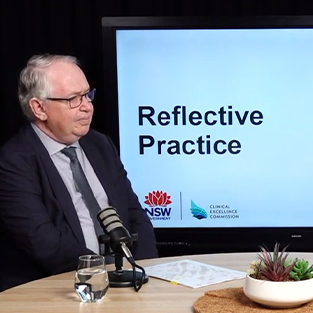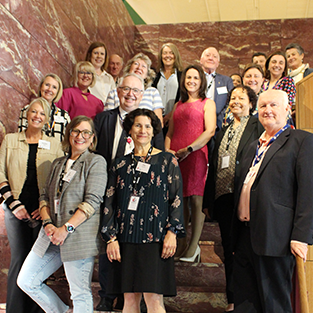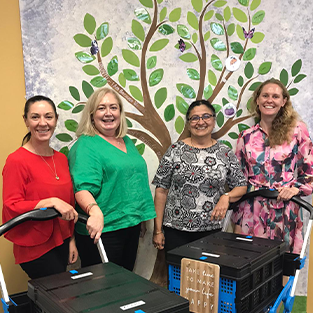Overview
The program was codesigned with NSW Health staff with the aim to build skills to better process and reflect on the impact of exposure to traumatic content related to patient safety incidents and adverse patient outcomes. Following a series of workshops, the CEC developed a suite of resources to support staff to enhance self-awareness and facilitate changes in professional behaviour.
Incorporating reflective practice into the NSW Health system can lead to improved patient outcomes, enhanced wellbeing, stronger teamwork and communication, and increased professional satisfaction among employees. By taking the time to reflect on experiences and learn from them, staff can strengthen a culture of continuous improvement and innovation. This evaluation has shown there is a strong need to embrace reflective practice as a valuable tool for achieving NSW Health goals and delivering high-quality care.
Partnership
CEC partnered with staff from all LHDs/SHNs and Pillar organisations. Initial training targeted patient safety practitioners: however, as interest grew, registration was opened to staff from diverse roles from across the system who were seeking capability building in reflective practice and tools to support application. Between October and December 2022, the CEC team delivered:
- 20 reflective practice skills workshops attended by 295 participants
- 9 reflective practice coaching sessions for manager / team members wanting to establish reflective practice in their ways of working with 85 participants
In total over 300 NSW health staff participated in the pilot program and are now part of a Community of Practice.
Thank you, for the resources and to everyone else for all the learnings and knowledge sharing.
Thank you for the resources and links. I found the training excellent and will put into practice all the new information!
Thank you, it was really beneficial, and I have recommended to our broader team.
Thank you for the training. I really enjoyed this. I would love to participate in more online training or face-to-face training.
CEC Expertise
A post-training survey found 44% of respondents were adopting reflective practice into their way of working, with another 38% adopting it intermittently.
Uptake of reflective practice learning has generated positive results for employees at a time when the risks of burnout are high. There are a range of supports available to assist NSW workers to process and learn from challenging work situations and reflective practice is well placed in the ecology of supports that include formal clinical supervision at one end and Schwartz Rounds at the other. The program appears to have met the needs of people in a unique way, targeting a need that falls in between these two ends of the support continuum.
We know that reflective practice fosters higher levels of wellbeing among health workers by reducing levels of stress, emotional exhaustion and burnout. When we make time to take part in reflective practice, it also strengthens our ability to adapt and respond to situations. We spend so long training for the specific skills and knowledge of our clinical roles but it's also important to allow time to consider how we maintain the wellbeing of individuals and their teams.
I must share with you how fabulous the reflective practice course was. I absolutely loved it! This was so relevant to my work, and I cannot thank you enough for squeezing me into a course. Melisah and Sue did such a wonderful job. They really should be congratulated, it was engaging, interesting, informative and we still were able to do group work virtually.
Individual reflective practice has helped me get down a little deeper to what actually happened with a situation, ignoring the biases, or patterns that I might be forming. I'm able to practice holding space/ holding tension, encouraging psychological safety, asking curious and open questions. I'm also able to use the model to help me focus on them, rather than what's going on in my head. I've usually ended with a way forward - something that I can bring into action. Having that sense of control or agency is greatly rewarding and beneficial for my wellbeing.
Reflective practice has become a core part of our team's work because of the strong benefits in wellbeing, personal and professional development, and facilitation skills. For me personally, using the reflective practice process has led to so many great learnings and allowed me to connect with and support my colleagues more effectively. Seeing the benefits of reflective practice translate across different contexts and with different groups has been exciting.

CEC Reflective Practice Workbook
A safer system
The evaluation was done through qualitative and quantitative data review collected via surveys, focus groups and interviews. Findings included:
- Reflective practice is considered by 90.7% of employees and 76.9% of managers as offering an important space to process trauma.
- 92% of respondents "strongly agreed or agreed" that they understood how to use the reflective practice model following the training.
- 91% of respondents "strongly agreed or agreed" that they had a deeper appreciation of the importance of reflective practice.
Incorporating reflective practice into everyday practice can lead to improved patient outcomes, enhanced wellbeing, stronger teamwork and communication, and increased professional satisfaction.
Meets Future Health priorities:
- People are healthy and well
- Our staff are engaged and well supported
Meets CEC Strategic Plan priorities:
- Safety Culture with Accountability
The tools on asking questions and looking at things from multiple perspectives are amazing. Also the importance of finding a third space to reset before going to the next difficult thing. This is important for our wellbeing.
People
The CEC Team:
- Debbie Draybi, Clinical Communication Lead
- Karen Patterson, Director Capability & Culture (CEC Executive Sponsor)
- Bernadette King, Principal Lead
- Debby Shea, Program Support Officer
- Mary Ryan, Team Effectiveness Lead
- Sue Sims, Safety Culture Lead
- Heather Moses, Partnering with People, Safety & Quality Lead
- Morwenna Williams, Clinical Lead - Maternal & Perinatal Patient Safety
Partners
- Melisah Feeney, Bendelta (external supplier) partnered in development and delivery of the resources and workshops.
References
British Psychological Society (2020). 'The reflective room', BPS website, accessed 17 August 2021.
Curry A. and Epley P. (2022). 'It makes you a healthier professional: the impact of reflective practice on emerging clinicians’ self-care', Journal of Social Work Education, 58(2):291-307, doi:10.1080/10437797.2020.1817825.
DoH (Department of Health) (1993). A Vision for the Future Report of the Chief Nursing Officer, NHS Management Executive, London.
Edmondson, A. (1999). 'Psychological safety and learning behavior in work teams'. Administrative science quarterly,44(2), 350-383.
Fraser, A. (2021). The Third Space. Random House Australia.
Gibbs, G. (1988). Learning by doing: A guide to teaching and learning methods, Further Educational Unit, Oxford Polytechnic, Oxford.
Greene, J. and Grant, A.M. (2003). Solution-focused coaching: Managing people in a complex world, Pearson Education, UK.
Harrison, R. (2021). 'The power of reflective practice: evaluating the impact of a psychoeducation and reflective practice group for surgical nursing staff and healthcare assistants in a trauma centre', Cambridge University Press, 7(S1):S191–S191, doi:10.1192/bjo.2021.515.
World Health Organization. (28 May 2019). Burn-out an "occupational phenomenon": International Classification of Diseases.



